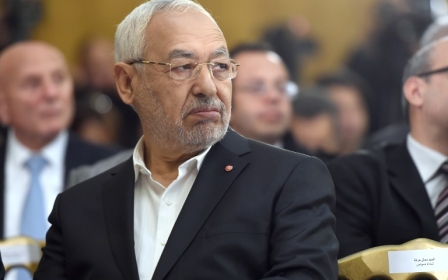Ghannouchi re-elected as leader of Tunisia's Ennahda party

The president of Tunisia's Ennahda party was re-elected Monday, as the group meets for a key congress to discuss separating its religious and political activities.
Rached Ghannouchi, who won the ballot comfortably with 800 votes, about 570 more votes than the runner-up, said his party, which has its roots in an Islamist political movement, was keeping apace with changes in Tunisian society.
Ennahda is a "Tunisian movement that is evolving with... Tunisia and is part of its evolution," Ghannouchi said, according to local media.
"From today, we are seriously moving towards becoming a national and civil political party with an Islamic core, which operates under the country's constitution and inspires Muslim and modern values," he said.
Ghannouchi, 74, an intellectual who once advocated a strict application of Islamic law, founded the Islamic Tendency Movement in 1981 along with others inspired by Egypt's Muslim Brotherhood.
The movement became Ennahda in 1989.
Banned under the dictatorship of strongman Zine El Abidine Ben Ali, the party was legalised after the 2011 uprising that kicked off the Arab Spring and toppled the veteran leader.
Ghannouchi, who lived in exile for 20 years, returned to a triumphal welcome after the uprising and won post-revolution elections in October 2011.
But two years later, he had to step aside amid a deep political crisis.
In 2014, the secularist Nidaa Tounes party of President Beji Caid Essebsi won parliamentary elections, beating Ennahda which came second.
On the eve of the congress, French daily Le Monde published an interview with the party leader in which he said there was no longer any room for "political Islam" in post-Arab Spring Tunisia.
"Tunisia is now a democracy. The 2014 constitution has imposed limits on extreme secularism and extreme religion," he was quoted as saying.
Around 1,200 Ennahda delegates are meeting for the three-day meeting that opened Friday in Hammamet, south of Tunis, to discuss the party's future and adopt economic, political and social roadmaps.
New MEE newsletter: Jerusalem Dispatch
Sign up to get the latest insights and analysis on Israel-Palestine, alongside Turkey Unpacked and other MEE newsletters
Middle East Eye delivers independent and unrivalled coverage and analysis of the Middle East, North Africa and beyond. To learn more about republishing this content and the associated fees, please fill out this form. More about MEE can be found here.




